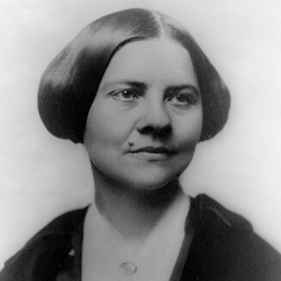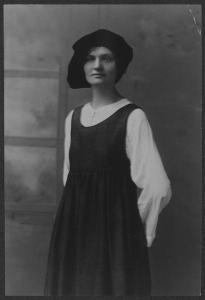Last night, I attended a panel discussion on campus featuring four prominent professors and moderated by the provost on a few of the important issues in this year’s election (healthcare, the economy, morality in leadership). The discussion itself was fun, and it was interesting to see gender and race divides so clearly (the two white male professors in almost constant opposition to the two minority female professors), but the overwhelming consensus between them was the importance of a voting decision. Dr. Carol Awasu from Nyack College’s social work program encouraged audience members to vote. If you are a woman, if you are a minority, if you don’t own property, she reminded the audience, you did not always have the right to vote, and so you should vote. Vote, because people have died to secure the right for you.
Especially in this election, which is the most gender-divided election in recent history, everyone who is able to vote should be voting. We owe it to our predecessors — to Elizabeth Cady Stanton, to Susan B. Anthony, to Alice Paul — to vote. I almost don’t care who you vote for, so long as you vote (of course, I want people to vote my way, but I’d rather a fair exercise of free will than a bunch of people voting against conscience).
I think that’s what those wonderful suffragists would want to see: a fair exercise of free will. That’s what they were after in pursuing equal suffrage. As for how they would vote if they were alive today — I feel like my fair guess would be for Obama, and here’s why:
1) Party Allegiance would be inverted, and thus they would vote on principles as opposed to party. After the Civil War, women’s suffrage split into two different camps, one aligning itself with the liberal Republicans and the other working to garner support from the more conservative Democrats. Lucy Stone stuck with the Republican party, and those who followed suit worked to tie female suffrage with freedman (those who had until recently been slaves) suffrage, but when that move proved to be unsuccessful, they willingly took a back-burner position to freedman suffrage. Now that women have the vote, a Republican suffragist from the mid-nineteenth century would likely choose to vote for Obama because of his egalitarian appeal and his insistence that female policymakers are necessary for appropriate lawmaking. Susan B. Anthony and Elizabeth Cady Stanton, frustrated by the sexism in the Republican party, broke off from their abolitionist roots and pursued a women’s rights platform through the Democratic party. The Democrats, for the most part, were uninterested, but Stanton and Anthony persisted in their hunt for political equality in more than just the vote. Fair pay, property ownership and child custody were also a part of their branch of the suffrage movement. Stanton and Anthony would be drawn to Obama because of the Democratic Platform’s position on women. All of these women would also be horrified by comments about rape that have come out of the Republican party during this election cycle (I’m looking at you, Todd Akin and Richard Mourdock). Don’t worry, women; Obama doesn’t understand their comments, either.
2) The restriction of voting rights that this election cycle has seen are abhorrent and being repudiated by the Democratic party. In case you’ve missed it, several state governments have either successfully or unsuccessfully been implementing new voter registration laws that require voters to have excessive and unnecessary amounts of identification in order to vote. My home state of Pennsylvania is also guilty in this; I chose to register here in New York instead. If Alice Paul were alive today, you can bet that she would be vocally opposing this from all sides, and as such, she would align herself with today’s Democratic party. Voting rights are an important part of the Democratic position, and the legislators who are creating the new voter id laws have largely been Republican. Think I’m inflating things? Check out this surprisingly astute Sarah Silverman video on voter id laws (my apologies for the profanity, if you find profanity an issue):
3) Obama signed the Lily Ledbetter Fair Pay Act; Republicans voted almost unanimously against it. Look at the vote results from the Senate on the 2009 act. Of the 61 senators that voted in favor of Lily Ledbetter, only two of them were Republicans; however, of the 36 senators that voted against it, all of them were Republicans. On top of that, Republican presidential candidate Mitt Romney did not support the Lily Ledbetter Act in 2009 and he would not have signed it. Would Romney overturn it if he reaches office? He says not, but early suffragists Anthony and Stanton would still be casting their vote with Obama because of this law. Though Anthony’s faction of suffrage did grow toward favoring the white middle class, she made a few concerted efforts to mobilize working class women to demand suffrage and fair pay. Toward the beginning of the film Iron Jawed Angels, the characters of Alice Paul and Lucy Burns advertise for suffrage amongst working class women, recruiting Ruza Wenclawska. Wenclawska, a Polish immigrant who changed her name to Rose Winslow, began working as a mill girl at age eleven. She would be voting for Obama.
Ultimately, I think these women would encourage anyone on the fence about voting for either candidate to vote, no matter what. But they would probably be voting for Barack Obama.


